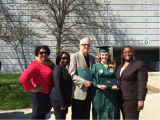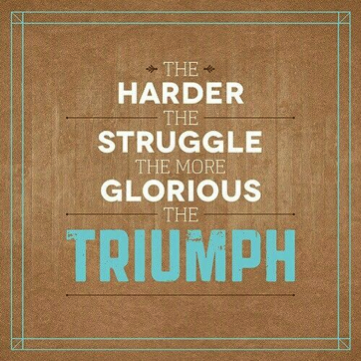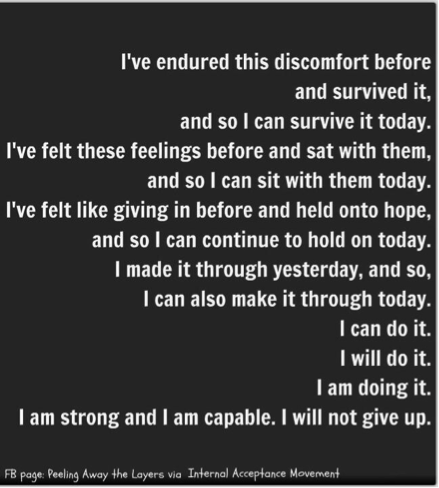
"Dear College-Freshman Version of Myself,
Before you read any further, I need you to know that you're going to be okay."
In my very first blog entry, I talked about how, in several months, I would become one of the 3% of former foster youth who graduate from college. On April 27th, 2014, I finally made it: I graduated summa cum laude from Eastern Michigan University with my Bachelor’s of Social Work. I became one of the “3%”, but the last thing I felt like was a statistic.
Two weeks before the graduation ceremony I went to the campus store to buy my cap and gown after one of my evening classes. I stood in the empty room at 8:00pm in a corner near the back, trying on a stiff dark green gown that felt foreign in my hands and over my clothes. When I looked at myself in the mirror, I expected the ceiling to break and spotlights to appear and some sense of divinity to cue music that would signify the importance of this moment. Instead, I simply saw plain ol’ tired me swimming in dark green fabric. “I should feel something,” I thought to myself. But all I felt was my empty wallet when I handed my $43 to the cashier, who wished me a grim, dull “congratulations” as I exited the store.
Driving away from the university with the cap and gown placed neatly on my passenger seat, I had a mini quarter-life crisis. Graduation didn’t feel like I expected it to. I expected to feel different somehow, like I was accomplished and relieved. Instead, I found myself feeling confused, lost, and slightly terrified of what came next and how to find it. At the end of it all, I started to realize, a degree is a piece of paper, letters after my name, and ~$40,000 in student loan bills. It’s not a guarantee that I will have a job, feel supported, or have a place to call home. In the midst of my mini-crisis, I realized that my degree – this milestone I’ve been working toward, yearning for, and losing sleep because of –means nothing by itself. It does mean something, however, if the additional domains of my life are stable.
The days leading up to graduation were a blur. I frequently encountered stress regarding my decision to share my graduation ceremony celebration with people I’ve felt particularly bonded to throughout my recent journey, which do not include my biological parents or immediate biological family. I still feel a twinge of guilt regarding this decision, as evidenced by the nagging pull in my stomach. I told my mom I wasn’t “walking” across the stage to get my diploma. If I did share that information, I would have had to explain that I wasn’t sure if I wanted her and my dad to be there. I didn’t feel prepared to do that. Instead, I shared the day with people I care about and respect very much: two of the amazing women who have supported me from my scholarship program at Foster Care to Success – one of whom I’ve known since my freshman year of college, a beloved representative of Casey Family Programs, the director of student affairs at my university, my campus coach and friend from the MAGIC program at my university, the wonderful young man I’m in love with, and Maddy from FSM, someone who has guided me both personally and professionally. I wasn’t nearly as excited to graduate as I was to spend time with these amazing individuals. Even on graduation day as I crossed the stage, what meant most to me was not receiving my diploma but rather that I had people in the audience who I loved (and whom I feel loved by) to watch as I received it. On that day and in that moment, I didn’t feel like one of the 3% of former foster youth who graduate from college; I felt like many of my peers: excited (and terrified) for what’s to come, and proud of my accomplishment.
As I exited the convocation center, everything felt as if it came full circle. The sun was blindingly bright as all the recent graduates scanned the massive crowd for the face or voice of someone they loved. Then I heard it: my sweet boyfriend’s voice calling me by the nickname that only the closest to me know, motioning for me to met him at the end of the line. “Everyone’s over here,” he assured me, once I finally found him. He took my hand and led me slightly away from the crowd. In the sea of people, I couldn’t make them out at first. But then I saw them, and they saw me. My family. When they saw me, they began cheering and waving and screaming. I remember walking toward them in the sunshine, my cheeks hurting from how big I was smiling, and loving every single step into their embrace.

The best part of graduation, however, was the meal they hosted for me afterwards. I invited some of my closest friends and people I love, including a former teacher who has become a close friend, the adorable little boy I used to babysit for and some colleagues turned friends from my internship. At this dinner, I was presented with the knowledge that I will be receiving a scholarship for graduate school from Casey Family Programs, which will allow me to pursue my dreams. Since learning this news, I’ve decided to explore a dual major in Social Work and Public Policy, furthering both my academic and professional endeavors and increasing my likelihood of future success.

… But I’m not out of the woods yet. Though I have graduated, I am frequently reminded of the continuous obstacles I will face in my journey. I am still navigating my relationships with family from and prior to my foster care placement, both biological and formed. I am continuously sifting through the memories, nightmares, and emotions I have regarding my experience in foster care. The questions I have are consistently evolving: “who am I, both personally and as a college graduate? How do I talk about my experience in foster care as a professional? How do I remedy the negative feelings I have toward my past and my experience?”
However, I’ve come a long way. As I reflect on the numerous ways I’ve grown since freshman year, there are a few key things I wish I could go back and tell my 18-year-old self. You can read them below.
-----
Dear College-Freshman Version of Myself,
Before you read any further, I need you to know that you’re going to be okay. You’re not just going to survive the next 5 years of college (surprise! The “4 year degree” thing they keep referring to in orientation is all a lie), but you are going to thrive. You are going to absolutely love your life, for the first time in your life, in 5 years. I know you don’t believe me now, and I don’t blame you. Why should you believe me? You’ve been conditioned to believe that trust can be both difficult and dangerous. You’ve been taught that when your foster care worker says “it’ll only be for a few days”, she really means 8 months and that “permanency” is a transient term. You’ve been shaped to think trust extends only as far as mandatory reporting begins. Though these beliefs were true within your experience of foster care, they’re not usually true once you leave care.
Adjusting the way you view the world will help you tremendously. Right now, you don’t trust people. You don’t trust systems, understandably so. Your first instinct is to think that people are trying to hurt you and not help you. Unfortunately, sometimes this is true. However, the majority of times, it isn’t. You’re going to meet a whole bunch of people who are involved with your life because of who YOU are, and not because you were in foster care. This may take time to get used to, but approaching opportunities and relationships without the guarded wall that the foster care system has helped you build will benefit you. People can’t help you, support you, and love you if you keep pushing them away.
You’re going to need to reach out. For help, for resources, for support, for connection. This might feel scary, difficult, or simply burdensome. However, you won’t make it without support. Reaching out will save you. Your situation is a little different from that of your peers, and whether that’s right or wrong or fair or unfair, you can (and will) make the most of it. There are resources, scholarships, support systems, and opportunities out there for you. Though asking for help is sometimes portrayed as weakness in our society, the opposite is actually true: being able to ask for help represents strength. No one can make the journey from high school to college and then to career on their own, regardless of whether they were in foster care or not.
You’re also going to have to try really hard. And some of the time, (okay, most of the time) it’s going to feel like you’re trying harder than everyone else. When you are working 50+ hours a week and taking 12 credits while it seems like the majority of your peers are receiving financial assistance from their parents, you’re going to feel like it isn’t fair. It might not be. You might even feel like it would be easier to give up, whether that means giving up on college, an individual class, or giving up on yourself. But don’t give up. I can’t promise that things will get easier, but I can promise that you’ll get better at handling them. I also promise that your hard work will pay off.
You’re going to need to choose your decisions wisely. I completely understand and empathize with how you’re feeling right now: free from the regulations of the foster care system, you’re feeling like, for the first time ever, you don’t need to answer to anyone. That’s only partially true. You have to answer to me, the 5-year-later version of yourself. The choices you’re making now affect me. They affect your life in ways they may not affect another person who hasn’t experienced foster care. Think about what happens if you were to get caught drinking alcohol or doing drugs, for example. The initial consequences mirror those that any student faces: a ticket or arrest, a possible criminal charge on your record, hefty fines, potential court dates, and having to check “yes” when asked on job applications whether you’ve ever been convicted of a criminal offense. But as a student receiving financial aid, you will lose your scholarships and loans. Right now, your scholarships and loans are the only way you can afford to attend college. As a student already struggling to make ends meet and support yourself financially, you’ll have another expense without the financial support you need. Additionally, being labeled with a charge of “minor in possession” or other criminal offense will perpetuate the stereotypes you’re working so hard to fight as an alumni of foster care. Unfortunately and unfairly so, the journey from foster care to college and then from college to career will be more difficult for you than the majority of your peers. I’m not going to tell you what to do, because the choice is ultimately yours and it’s completely up to you what you choose. I am going to tell you, however, that you need to be prepared to deal with the consequences of your choices.
You are worthy, and you deserve to start believing that. You deserve good things. You are worthy of opportunities, of support, of recognition, and of love. You’re worthy despite how many times your experiences have made you feel otherwise. You are not defined by what you have been through; instead, you are defined by the ways those experiences have shaped you.
Finally, you are not alone. There are so many people rooting for you. Some of them you’ll never know and never meet, and others will become some of your closest friends. You are not alone, and you deserve to be happy, successful, and loved.
And you will be.
Love,
The College-Graduate Version of Yourself
